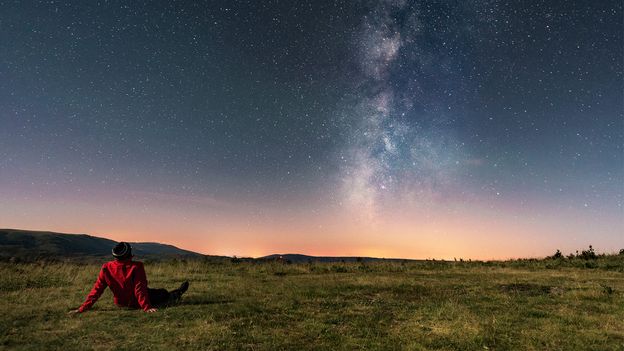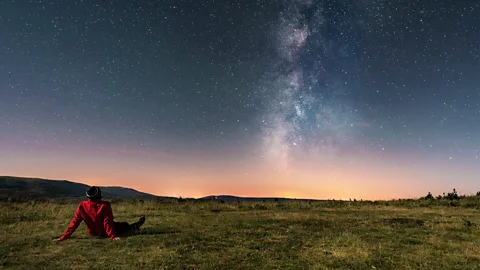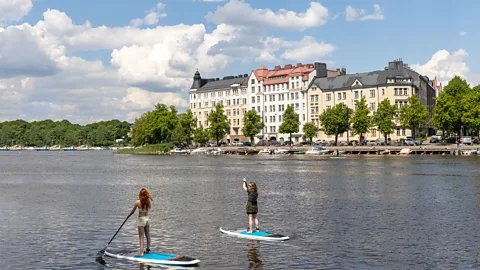Travel
The seven travel trends that will shape 2025

 Getty Images
Getty ImagesAs you start to look at the year ahead, have you thought about how you will be travelling? The world’s travel firms – from Airbnb to Booking.com – have.
Their predictions, gathered from survey data, user behaviour and forward bookings, function as an annual showcase for new ideas in the industry, from identifying future hotspots to considering how and why we will explore the world in the upcoming year.
“People are drawn to trends because they offer a sense of structure and understanding in an increasingly complex and fast-paced world,” explains Jenny Southern, CEO of Globetrender, the world’s leading travel trend forecasting agency. “When it comes to travel, trends provide clarity and a roadmap for how to engage with the world around us.
For cultural futurist Jasmine Bina, CEO of Concept Bureau and an experienced analyst of consumer behaviour, they are a signifier of our deepest longings. “Travel trends are a window into what people really desire when the rules of everyday life are suspended,” she says. “Right now, what they really want is to feel transformed.”
While the travel industry has largely returned to pre-pandemic levels, economic uncertainty, the ongoing wars in Ukraine and the Middle East and the change of presidency in the US is making 2025 feel anything but predictable.
“You could say that perhaps we are looking for new anchors,” says Bina. “Travel trends like stargazing, holiday romance, nostalgia tourism, sleep tourism, digital detoxes and so on show us that people are searching to be reconnected to something bigger than themselves.”
Southern agrees. “Trends create a shared narrative – a sense of collective discovery – where we are all participants in a global dialogue about what matters,” she says. “Whether it’s the allure of off-the-beaten-path destinations or the desire to ‘travel with purpose’, trends provide us with an anchor, making it easier to understand where we fit within the broader landscape of global travel.”
Here are some of the top trends forecasted for 2025, as predicted by some of the world’s leading travel brands and tour operators.
 Getty Images
Getty Images1. Noctourism
Noctourism – nocturnal + tourism – encompasses nighttime travel experiences, from late-opening museums to bioluminescent beaches to northern lights watching. Solar activity is going to be at its highest for decades in 2025, sending higher than average numbers of charged particles to interact with the Earth’s atmosphere, creating dramatic aurora viewing opportunities. Award-winning UK travel firm Trailfinders tips Finnish Lapland and Norway’s Lofoten Islands, plus Svalbard and Iceland as prime destinations to see them. Noctotourism interacts neatly with what’s always been a key tenet of the travel industry: fostering connection with the wider world.
2. Calmcations
Calmcations – holidays purely focused on creating a sense of tranquillity – continue to be popular for 2025. Noise is in particular focus, following a report from the World Health Organisation that rates noise pollution, particularly from traffic, as the second most important cause of ill health in Western Europe.
Havila Voyages has created “quiet escapes” along the Norwegian coast that offer a chance to step away from the clamour of everyday life, featuring sound monitoring stations and a live noise forecast that compares the output in decibels against cities including New York, Paris and London. Alternatively, Unplugged offers tech-free cabins in the UK and Europe with a mission “to help the always on switch off”; while brand new retreat Majamaja in the Helsinki archipelago comprises of a series of architect-designed off-grid cabins that allow you to reconnect with nature. It’s all a sign that right now, the escapism of travel includes escaping technology.
3. Travel meets AI
We can expect to see technology start to play a larger role in trip planning: travel tech company Amadeus found that almost 50% of its customers are planning to prioritise generative AI through 2025. The survey also noted, however, that many travel firms are still not quite sure how to use the technology; they could take inspiration from flight-free holiday firm Byway, which has created its own proprietary AI engine to take the complexity out of timetables and multi-country travel, solving a significant problem when it comes to European travel.
Other firms, including Trip Advisor, are employing generative AI to help build itineraries for trips, while a growing number of airports are ditching paper tags and using the technology to sort baggage more efficiently. At Hyatt hotels, an AI-powered bed can monitor your heart rate, movement and blood pressure to offer more comfort and a better night’s sleep.
But it’s not all positive for technology. According to research from ABTA association of travel agents and tour operators, a Gen Z traveller is now almost as likely to be flicking through a holiday brochure for travel inspiration as browsing the internet for ideas, hinting that the trend towards tech is not universal.
 Getty Images
Getty Images4. The return of the holiday romance
Going hand in hand with the rise in digitisation has been a rise in digital burn out, particularly when it comes to relationships. According to a 2024 Forbes Health survey, 79% of Gen Z feel exhausted from online dating. How to solve the problem? A travel trends report from Globetrender and Amadeus includes a section on meeting new people in real life as one of its five key predictions for the year.
Whether you have a holiday romance or not, it’s easier than ever to find a trip where friendship can blossom with increasing numbers of group and solo travel opportunities. G Adventures and Flash Pack are just two firms offering expanded options for solo travellers seeking social adventures.
5. Off-the-beaten-track goes mainstream
After significant overtourism issues in 2024, off-the-beaten-track destinations are on the rise. As Byway notes in their travel trends of 2025, “people want to travel where they’re welcomed wholeheartedly”. The firm cites “destination dupes” – holiday locations that are similar to popular hotspots – as a trend to watch, where travellers may swap the likes of Cornwall for Norfolk, for example.
Other key destinations for the year are a little more off the traditional tourist map. Trailfinders names Uzbekistan as one of their top places to visit; while luxury tour operator Scott Dunn is tipping East Africa’s islands, thanks to new hotel openings in Zanzibar and Madagascar and a new luxury yacht experience in the remote Aldabra islands.
At Airbnb, the top 20 hot destinations for 2025 include Milton Keynes and East Sussex. Their list was drawn from data including trending searches and wish-listed cities on the site. It also includes Rome, Tokyo and Milan, all cities that suffered from overtourism in 2024, showing that the issue is far from over.
 Getty Images
Getty Images6. Coolcations and off-season safaris
For those used to holidaying in southern Europe, the question has moved from “where’s hot?” to “where’s not”. As temperatures in traditional summer holiday hotspots around the Mediterranean continue to break records, climate change is having an increasing influence on where we travel. Scott Dunn saw a 26% increase in bookings to Finland and Norway in 2024 and expects to see more tourists heading to northern Europe where summer temperatures are in the mid 20s.
Seasonal change is not just affecting beach goers; it’s also having an impact on those travelling to see wildlife. Peak safari travel month has shifted from December to March at Scott Dunn, thanks to shifting climate patterns and affordability. Climate change is a reality, and the industry and travellers are catching up to it.
7. Nostalgia travel
Will ’90s music icons Oasis and Eminem follow Taylor Swift’s lead and disrupt the travel industry in 2025? The pop star is credited with boosting travel and tourism around the world during her Eras tour, which concluded in December 2024. While music tourism is a rising trend, Eminem and Oasis’ revival tours also speak to something else: the rise of nostalgia tourism.
Globetrender calls the trend “New Heydays” and notes that as millennials enter middle age, the holidays they loved as children will get a reboot. It expects to see adult summer camps in the US, a rise in interest in Eurocamp (camping holidays in continental Europe) and all manner of retro pop ups, like the Polly Pocket Airbnb of 2024, grow in number. It’s perhaps an indicator that we want a little respite from uncertainty and are seeking a retreat to the more comfortable world of our childhoods.










